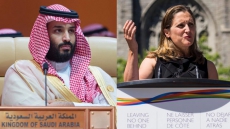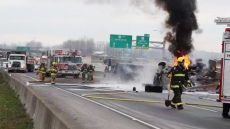OTTAWA — Justin Trudeau says he's confident he'll win re-election next fall by sticking to a positive, thoughtful approach to difficult issues, in contrast to the Conservatives whom he accuses of resorting to bumper sticker slogans that prey on voters' fears and prejudices.
Although recent provincial elections suggest Canada is not immune to the anti-immigrant sentiment or nationalist populist sloganeering that has swept through the U.S. and other countries around the globe, the prime minister argues that Canadians are getting wise to political leaders who promise easy, simplistic solutions to complex issues.
"I think one of the big distinctions that we see around the world right now is folks who want to exacerbate, amplify and exaggerate those fears for short-term political gain versus those who are trying to thoughtfully allay those fears," Trudeau said in a year-end roundtable with the Ottawa bureau of The Canadian Press.
"Obviously, it's easier to spook someone than it is to explain a complex answer," he said. "But I fundamentally believe in trusting citizens' capacity to be thoughtful about where we're going ... and that is what I am going to be putting forward as a vision for our politics, for our country and, by extension, I think for the whole world."
In that sense, Trudeau is drawing much the same battle lines that propelled the Liberals to a come-from-behind victory in 2015.
In that campaign, he points out that Stephen Harper's Conservatives adopted a strategy with "Islamaphobic undertones," including vowing to ban Muslim women from wearing the face-covering niqab during citizenship ceremonies and proposing creation of a "snitch line" to tip police to culturally barbaric practices.
By contrast, he said Liberals won by campaigning "on a thoughtful approach that was in total contrast with the versions of populism that were already beginning to creep into global discourse at that point."
Since then, Trudeau acknowledged populism has swept through some European countries and the United States, with the election of President Donald Trump, and right-wing, nationalist forces have become more effective at disseminating messages designed to inflame anxieties and tensions through social media.
Here in Canada, Quebecers elected Francois Legault's Coalition Avenir Quebec on a platform of reducing immigration and banning certain public servants, including teachers, police and judges, from wearing religious symbols.
While those ideas might be "popular at first blush in a populist speech," Trudeau predicted that Quebecers will change their minds once they "actually dig into the real world consequences of allowing and encouraging discrimination based on someone's religion within a free society."
He argued that Canadian have become "more aware of the dangers of populism, the consequences of populism."
As proof, Trudeau pointed to the growing disenchantment of Ontarians with Progressive Conservative Premier Doug Ford, whose popularity has plunged in just six short months as his fledgling government reels from one controversy to another.
Ford "did certainly promise easy answers to complex questions and seems to be having a certain amount of difficulty in actually moving forward in a way that is actually saving people money," said Trudeau.
The same criticism, he argued, can be levelled at Andrew Scheer's federal Conservatives, whom he described as exploiting "wedge issues" — such as spreading deliberate "disingenuous misinformation" about the recent United Nations compact on migration — while "doubling down" on the same policies advanced by Harper on everything from the economy, to international affairs to Indigenous reconciliation.
He dismissed suggestions that he's indulging in fear tactics or smears of his own when he equates Scheer with Harper.
"We had this discussion quite a bit during the 2015 election where my emphasis on sunny ways had people going, 'Aha!' any time I'd say something critical of Stephen Harper," he said.
"I'm always going to be very, very sharp any time there are clear distinctions in policy, in approach, in the way someone indicates their tendency to perhaps divide Canadians or exploit faultlines rather than pulling together.
"I will make no apologies for being very passionate, sometimes overly enthusiastic, in the way I engage in a robust debate. But I am, as much as possible, going to keep it on a substantive level."
He argued that it's perfectly fair and factual, for instance, to point out that Scheer has no plan to tackle climate change, other than opposing the Liberals' carbon tax, which goes into effect next year.
"There's lots of important debates to be had on ... how the best way to fight climate change is. But they still seem stuck on whether to fight climate change and I don't think Canadians are there, but certainly that's where Harper was and that seems to be where they still are."

